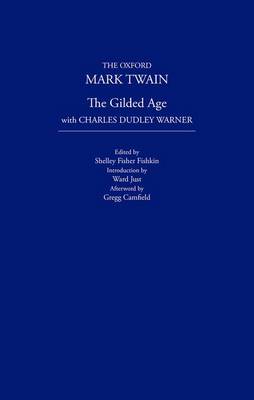Modern Library Classics (eBook)
5 total works
The Gilded Age, by Mark Twain and Charles Dudley Warner, is a political roman a clef--a direct and caustic attack on government, politicians, and big business in Post-Civil War America. It is the book that gave an era its name. Published in 1873, the first year of the second scandal-ridden Grant administration, it is the first novel of consequence about Washington in all of American writing, as Ward Just notes in his Introduction. The Gilded Age "gives Washington the aspect of a clumsy frontier town of ludicrous aspirations, populated mainly by fools, racketeers, opportunists, and parvenus, most of them members of the United States Congress," Just writes. The Gilded Age trains its satire on corruption in politics, business and the courts; "As Twain famously said, there is no distinctly native American criminal class except Congress, and the great triumph of The Gilded Age is that we are given chapter and verse on how the thievery is done." Just notes that readers will see for themselves whether Twain and Warner's subtitle for The Gilded Age--"A Tale of To-Day"--is still accurate."
In 1867, Mark Twain set out from New York City for Europe and the Holy Land on the paddle-steamer Quaker City. The result of that trip was The Innocents Abroad, a travel book unlike any that had gone before it. Irreverent and irrepressible, Twain pokes fun at officious tour guides and offensive tourists alike. The book offers a glimpse of a major writer when he was young and just beginning to flex his muscles, and also serves as an enduring no-nonsense guide for the first-time traveler to Europe and the Holy Land. The trip stimulates Twain to meditate on how the "new world" is different from the "old" and engenders reflections on what a society must be like to be thought of as genuinely "civilized." The Innocents Abroad is alternately profound and profoundly entertaining. Twain may find himself exasperated or exhausted--but the story he tells is never dull. It is no wonder that the book was a hit on both sides of the Atlantic.
A Tramp Abroad, published in 1880, is Mark Twain's second travel book, a sequel to his immensely popular The Innocents Abroad. Here Twain returns to Europe in the company, as Russell Banks puts it in his introduction, of a genial "goad, guide, and all-purpose straight man" modeled on his friend and real-life traveling companion, Joe Twitchell, who "plays Butch Cassidy to Twain's Sundance, Sancho to his Quixote." The eccentric journey they take through Germany, Switzerland, Italy, and other countries constantly veers into imaginative burlesques, exaggerations, tall tales, and humorous digressions, the most well known of which are the inimitable "Baker's Blue-Jay Yarn" and "The Awful German Language." The travelers gamely take in student duels, Wagnerian opera, and the works of the Old Masters; they travel by raft, train, and donkey cart, listen to folk legends and dreadful pianists, scale the Alps, and view cathedrals he found noble in their ugliness. But the sight that cheers them most is that of New York harbor on their return. A Tramp Abroad, Banks reminds us, celebrates two "American males clearly blessed with the gift of friendship, of giving it and of receiving and holding onto it."
Featuring the brilliantly drawn Roxanna, a mulatto slave who suffers dire consequences after switching her infant son with her master’s baby, and the clever Pudd’nhead Wilson, an ostracized small-town lawyer, Twain’s darkly comic masterpiece is a provocative exploration of slavery and miscegenation. Leslie A. Fiedler described the novel as “half melodramatic detective story, half bleak tragedy,” noting that “morally, it is one of the most honest books in our literature.” Those Extraordinary Twins, the slapstick story that evolved into Pudd’nhead Wilson, provides a fascinating view of the author’s process.
The text for this Modern Library Paperback Classic was set from the 1894 first American edition.
The text for this Modern Library Paperback Classic was set from the 1894 first American edition.
This unique collection of Twain’s essential short stories and semiautobiographical narratives is a testament to the author’s vast imagination. Featuring popular tales such as “Jim Smiley and His Jumping Frog” and “The Man That Corrupted Hadleyburg,” as well as some delightful excerpts from The Diaries of Adam and Eve, this compilation also includes darker works written in the author’s twilight years. These selections illuminate the depth of Twain’s artistry, humor, irony, and narrative genius.




